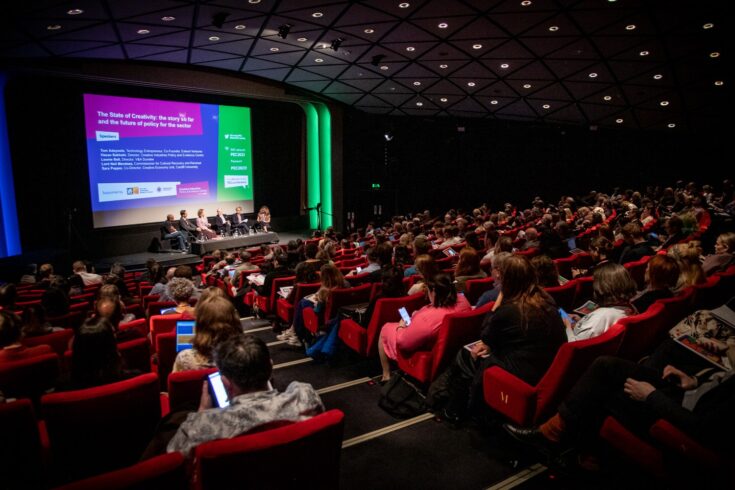On 27 April we welcomed 350 researchers, policymakers and industry professionals to our State of Creativity conference at BFI Southbank in London, generously supported by the Arts and Humanities Research Council (AHRC).
We reflected on the changing policy landscape for the UK’s creative industries and how the Creative Industries Policy and Evidence Centre (PEC) has contributed to the evolving evidence base in its first iteration.
The conference also provided an opportunity to discuss the research agenda for the next five years, as we move to a twin-hub structure with Newcastle University and the Royal Society of Arts as co-hosts.
Addressing UK policy needs
We are making this change in structure to more explicitly address the policy needs of the creative industries across the UK. With an increased emphasis on international partnership we are working towards global policy impact too.
This landmark event brought together the change-makers who can provide the impetus to place the creative industries at the heart of policy areas such as education, inclusion, immigration, regulation and climate.
There are as many challenges as there are opportunities in meeting this goal. We need more evidence and more effective engagement by researchers with policymakers and industry. Our conference offered a chance to take stock and build momentum.
Industry experts, leaders and researchers
We heard from leading industry experts such as Sir Peter Bazalgette, Leonie Bell and Tolu Stedford, research leaders like Professor Ruth McElroy, as well as policy leaders like Tracy Brabin and Lord Neil Mendoza.
We were also joined by researchers from across the Creative PEC consortium who have worked hard to ensure policymakers have the evidence they need to make impactful and timely interventions.
The need for the education system to better nurture the development of creative skills was identified as a clear priority. It was felt there was much to be learned from the experiences of the devolved nations, particularly at school age level.
Diverse and inclusive creative workforce
A more diverse and inclusive creative workforce was also judged to be crucially important, but with widespread recognition that nothing short of system change is needed to bring it about. Likewise with what the creative industries must do to help societies tackle the climate emergency.
There was much support for these two issues – equality, diversity and inclusion (EDI) and the climate emergency – to be the two single biggest cross-cutting priorities for future Creative PEC research.
State of Creativity report
During the conference we also launched our new ‘State of Creativity’ report, a collection of insights and arguments by 25 authors from across the creative industries.
It includes an essay by me on key policy developments over the past decade as well as pieces from thought leaders like:
- Syima Aslam, Artistic Director of Bradford Literature Festival
- Sarah Ellis, Director of Digital Development at the Royal Shakespeare Company
- Alison Tickell, Chief Executive Officer of Julie’s Bicycle
The report covers all the key topics addressed in the conference: from EDI and the talent pipeline through to sustainability, research and development (R&D), creative clusters and the implications of artificial intelligence.
Next five years
We have a unique opportunity with the next iteration of the Creative PEC, thanks to the confidence AHRC has placed in us with a £9.5 million grant for the next five years.
It enables us to reach right across the UK and internationally, and build new partnerships to achieve our strategic ambitions.
One new feature of the Creative PEC’s work over the next five years will be to publish more regular State of the Nation-style reporting, in recognition of the growing availability of data in key areas of policy. These reports will be centred on our four priority thematic areas, partly informed by where there are already existing UK centres of excellence:
- R&D, innovation and clusters (led by University of Sussex)
- creative education, skills, talent (led by Work Advance)
- internationalisation (led by Newcastle University)
- the arts, cultural and heritage sectors (led by The University of Sheffield)
New PEC network
In addition, we will be expanding our capacity to collaborate with other researchers. We will launch a new PEC network of research fellows, with the aim of becoming the global network of choice for analysts working on policies relating to the creative industries.
Please note recordings of all panels and keynotes at the State of Creativity conference will soon be available on Creative PEC’s YouTube channel. The State of Creativity report is available to download for free on Creative PEC’s website.



